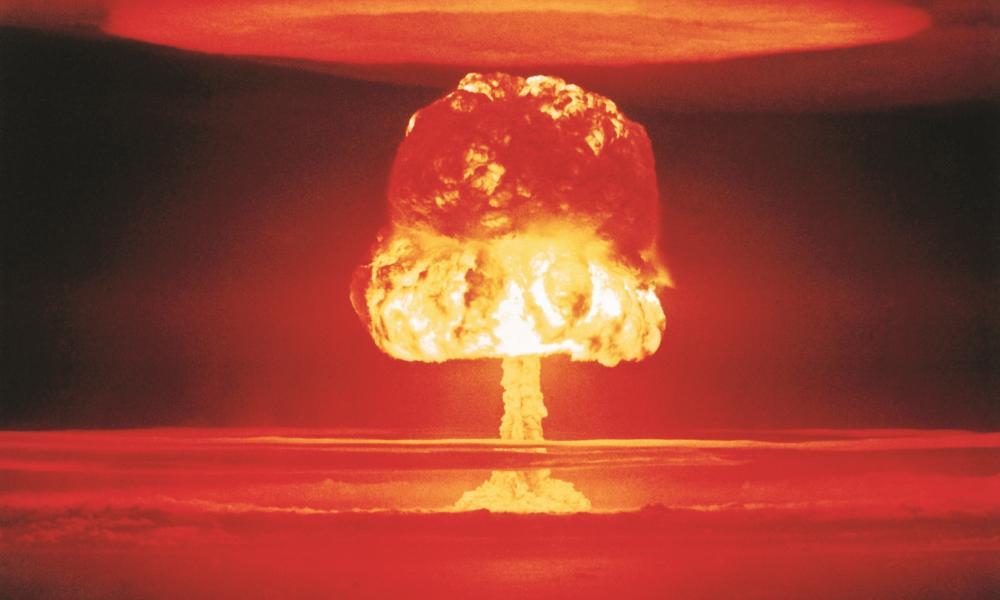
The Battle for Peace
A Lesson From the Priest Who Blessed the Atom Bomb
A Lesson From the Priest Who Blessed the Atom Bomb
Peace. How truly we need it! How truly our world needs it. Peace is a sign of our Lord’s presence with us. But there is a mystery here. Jesus’ presence did not always bring peace.
Remember what he said – “Do not think that I have come to bring peace upon the earth. I have come to bring not peace, but the sword. For I have come to set a man against his father, a daughter against her mother, and a daughter-in-law against her mother-in-law; and one’s enemies will be those of his household.” (Mt 10:34-36) Sounds like war!
So why do we call Jesus the prince of peace? (Is 9:5) Because he is peace and brings peace if one is open to it! When Jesus was born, the angels sang, “Glory to God in the highest and on earth peace to those on whom his favor rests.” (Lk 2:14) When he began his public ministry, the gift of peace was a part of the proclamation of good news. He told his disciples, “As you enter a house, wish it peace. If the house is worthy, let your peace come upon it; if not, let your peace return to you.” (Mt 10: 12-13)
After the resurrection, Jesus’ first words to the apostles in the upper room were “Peace be with you.” (Jn 20:19)
Jesus is the prince of peace, but many have trouble discovering how to receive it.
When Jesus came to Jerusalem, Luke’s Gospel says, “He wept over it, saying ‘If this day you only knew what makes for peace – but now it is hidden from your eyes.’” (Lk 19:42) Sadly, it still is.
Father George Zabelka, a priest from the Diocese of Lansing, had a deep conversion in terms of understanding Christ’s path of peace. He was the priest who blessed the B-29 bomber named Enola Gay that dropped the first atomic bomb – “Little Boy” – on Hiroshima, Japan, Aug. 6, 1945. He also blessed the second atomic bomb that was dropped on Nagasaki three days later. Over the next 20 years, God opened up his eyes to see the truth of what he had done. In the 1960s, Father George worked with Martin Luther King, Jr. during the civil rights struggle in Flint. Martin Luther King’s “ ... example and his words of nonviolent action, choosing love instead of hate, truth instead of lies, and nonviolence instead of violence stirred me deeply. ... after [Martin Luther King, Jr.] was jailed in Montgomery, and this blew my mind ... he said, ‘Blood may flow in the streets of Montgomery before we gain our freedom, but it must be our blood that flows, and not that of the white man. We must not harm a single hair on the head of our white brothers.’”
Father George’s life was turned upside down by the Lord and the witness of Christian peacemakers. he “went through a crisis of faith. Either accept what Christ said, as impossible and silly as it may seem, or deny him completely.” Father George chose complete acceptance of Christ. That gave him peace of heart. But much more work needed to be done. He spent the rest of his life trying to bring healing, reconciliation and Christ’s peace to others. He spoke out against war and the incredible economic and political focus of nations that continue to fuel the war machine.
I will let Father George speak for himself. These excerpts come from a speech he gave in 1985:
War is now, always has been, and always will be bad, bad news. I was there. I saw real war. Those who have seen real war will bear me out. I assure you, it is not of Christ. It is not Christ’s way.
The morality of the balance of terrorism is a morality that Christ never taught. The ethics of mass butchery cannot be found in the teachings of Jesus ... So the world is watching today ... What the world needs is Christians who, in language that the simplest soul could understand, will proclaim the follower of Christ cannot participate in mass slaughter. He or she must love as Christ loved, live as Christ lived, and, if necessary, die as Christ died, loving one’s enemies.
Now, brothers and sisters, on the anniversary of this terrible atrocity carried out by Christians, I must be the first to say that I made a terrible mistake[in blessing a nuclear weapon].
All I can say today is that I was wrong. Christ would not be the instrument to unleash such horror on his people. ... I was there, and I was wrong. Yes, war is hell, and Christ did not come to justify the creation of hell on earth by his disciples.
We must all become prophets. I really mean that. We must all do something for peace ...
What does the Catholic Church teach about war?
Those who are sworn to serve their country in the armed forces are servants of the security and freedom of nations. If they carry out their duty honorably, they truly contribute to the common good of the nation and maintenance of peace.
Public authorities should make equitable provision for those who for reasons of conscience refuse to bear arms; these are nonetheless obliged to serve the human community in some other way.
The church and human reason both assert the permanent validity of the moral law during armed conflict. “The mere fact that war has regrettably broken out does not mean that everything becomes licit between the warring parties.” (cf CCC 2310-2312)
“Every act of war directed to the indiscriminate destruction of whole cities or vast areas with their inhabitants is a crime against God and man, which merits firm and unequivocal condemnation.” A danger of modern warfare is that it provides the opportunity to those who possess modern scientific weapons – especially atomic, biological, or chemical weapons – to commit such crimes.(CCC 2314)
Spiritual exercise: being a peacemaker
In our spiritual fitness exercise this month, we ask the Christ child to make us like simple children who will be people of peace.
• Peace must begin and reign within us. It starts with a heart that is reconciled to God and others. As a preparation for celebrating Christ’s birth and receiving his peace, take part in the sacrament of reconciliation.
• Pray for peace. The prayer of St. Francis is always a good source of meditation. Try the following image to help you. Think of yourself in a boat tossed about in the waves near a rocky cliff. You are frightened and threatened because the boat is coming close to being smashed against the rocks. Suddenly, you realize that you are not alone in the boat. The Lord is with you. Your fear blinded you from seeing him. He takes an oar and, with strength, guides the boat along the rocks into a cave along the cliffs. Looking back through the opening of the cave, you see the storm raging and waves bursting all around. But you are with Christ in the boat, and the waters all around you within the cave are tranquil and calm. You are in still waters.
• Work for justice. Without true justice, there can be no peace. There are many social issues that destroy peace. The violence of war destroys peace. The violence of abortion destroys peace. The violence of poverty destroys peace. Educate yourself on any of these issues and get involved in being the solution to the problem. There really is no better way to celebrate the birth of the true Prince of Peace than by being a peacemaker.



